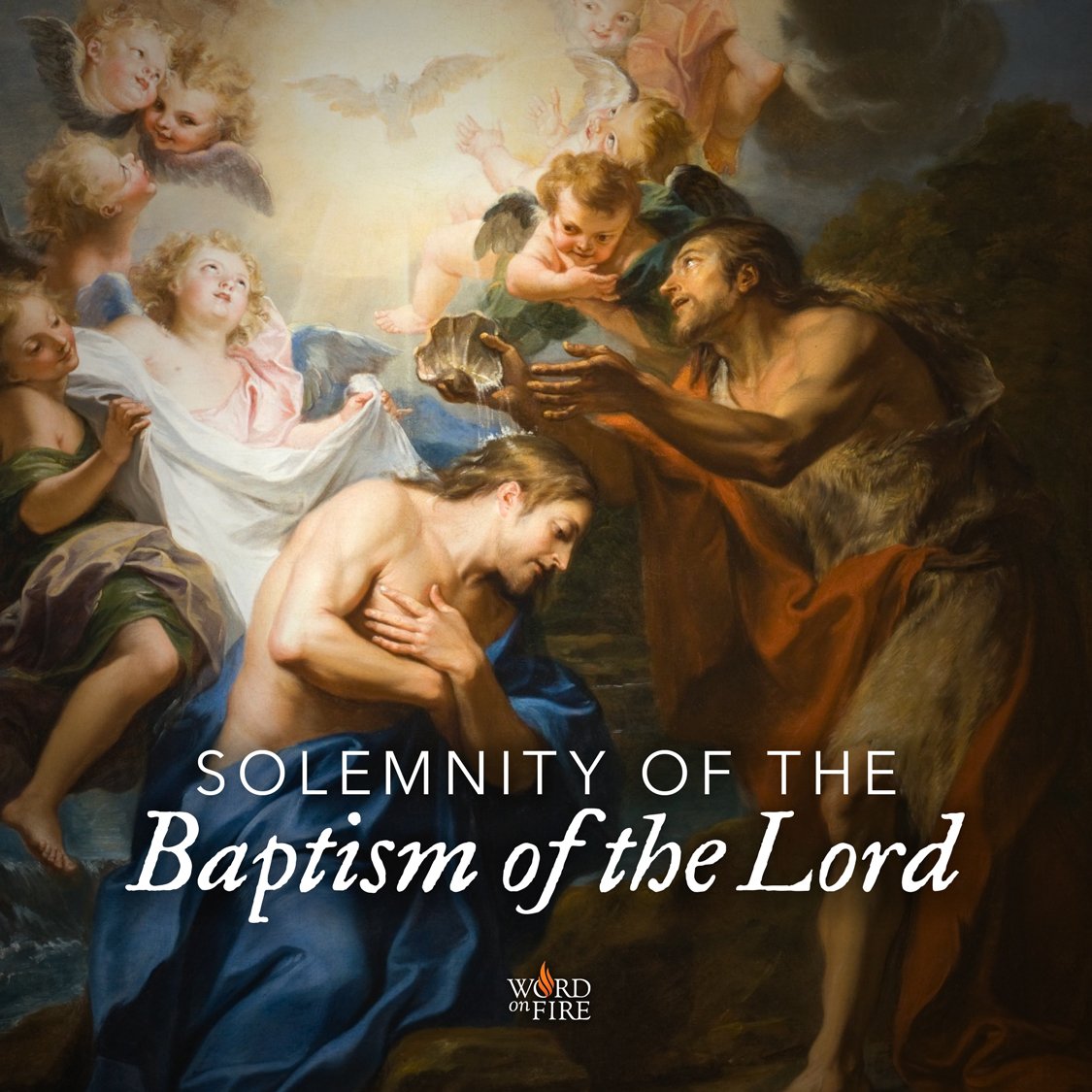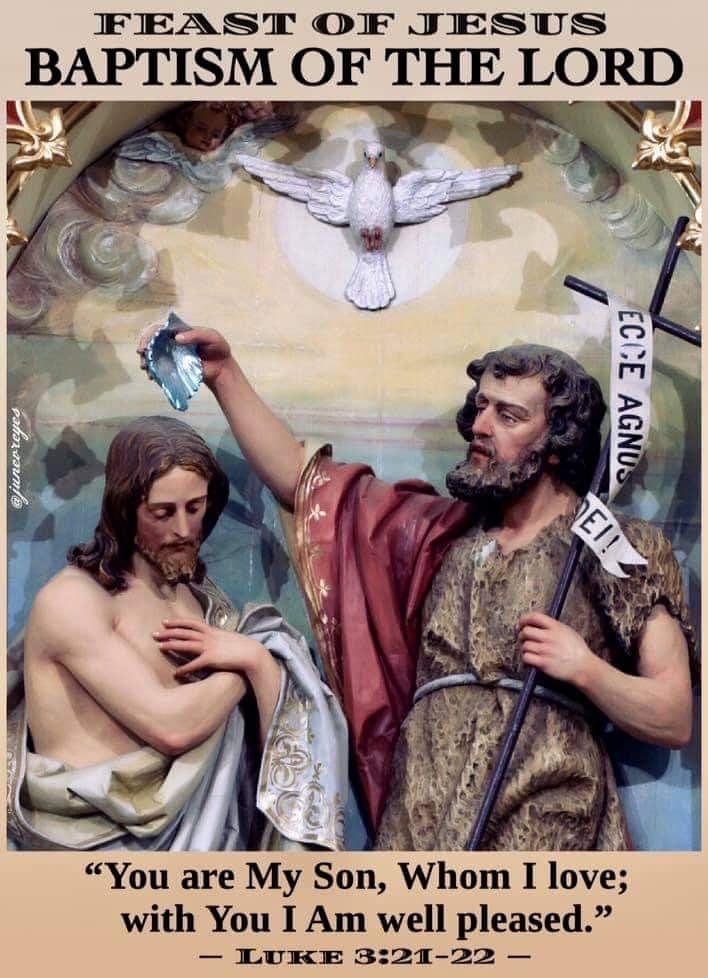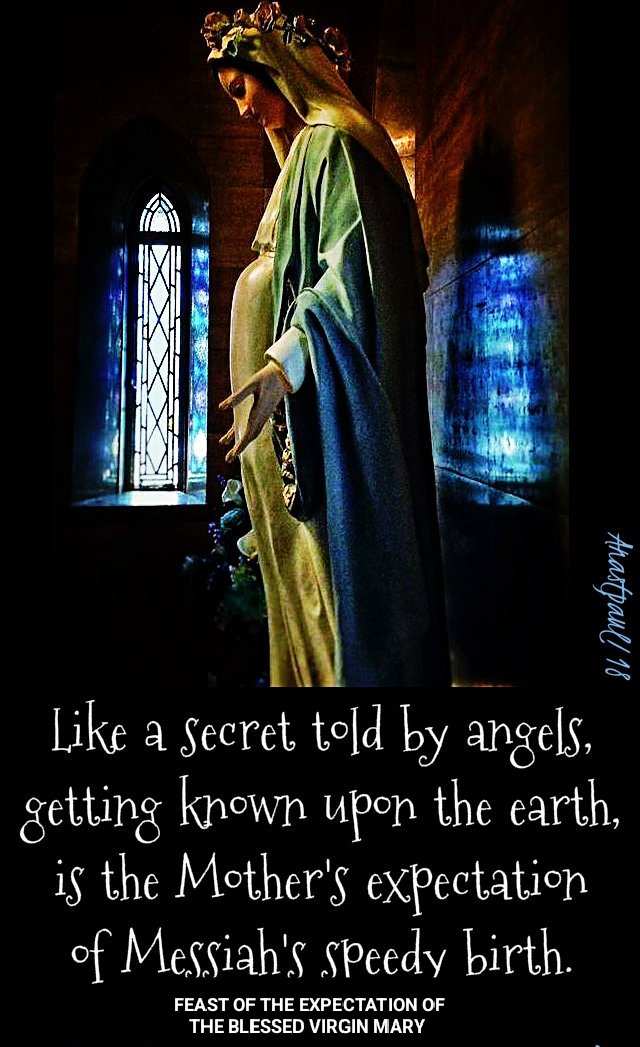
John 17: 11
January 8, 2022
Luke 9: 23-24
January 9, 2022MEMORIAL OF THE BAPTISM OF THE LORD IN THE RIVER JORDAN
After all the people had been baptized and Jesus also had been baptized and was praying, heaven was opened and the Holy Spirit descended upon him in bodily form like a dove. And a voice came from heaven, ”You are my beloved Son; with you I am well pleased.” Luke 3:21–22
In Catholicism, a great deal of emphasis is placed on the rituals surrounding the events of Jesus’ life from birth to resurrection to death, each detail minutely scrutinized and carefully celebrated in its own way. One such celebration is the Baptism of the Lord, which is celebrated in January every year. Originally observed through the event known as the Epiphany, which marked three events from the Gospel, it denoted the visit of the three Magi to the baby Jesus, the baptism of Jesus in the river Jordan and the wedding at Cana where Jesus performed his first miracle, turning water to wine.
The Magi became the most prominent celebration of the Epiphany, and in 1955 Pope Pius XII instituted a separate liturgical commemoration for the Baptism, as the 13th of January. This was changed by Pope John XXIII and subsequently by Pope Paul IV, to its current date of the first Sunday after 6th January (the Epiphany), or if in a particular country the Epiphany is celebrated on 7th or 8th January, the following Monday. The feast marks the end of the liturgical season of Christmastide and the beginning of Ordinary Time.
The Baptism of Christ would seem to be a paradox, since in Catholicism baptism is meant for remission of past sins and Christ was said to be born without Original Sin. However, by humbling himself, the Son of God, to John the Baptist, Christ is seen to have been taking on the sins of others and giving his followers a model to replicate – it was necessary not for him, but for mankind. After the Epiphany, which is seen as the first manifestation of the Lord, the Baptism is the second manifestation, and marks the transition from Jesus’ hidden life to that of his public ministry. It is a manifestation announcing Jesus’ divinity to all of his first followers and to the disciples of John the Baptist.
Christian baptism receives its meaning and significance from the baptism of Jesus. At the baptism of Jesus, the heavens opened, signifying that it is not simply a ceremony we perform, but has to do with heaven, for it is God who acts in baptism. Firstly, in Jesus’ baptism, the Holy Spirit descended upon Jesus in a bodily form, as a dove, so that all could see. In baptism we are anointed, and sealed with the Holy Spirit. Secondly, a voice from heaven declared, ‘Thou art my beloved Son, with whom I am well pleased’. It was a public declaration by God that Jesus was his beloved Son.
The baptism of Jesus was not simply a private affair, or personal experience of the Holy Spirit descending over Jesus, to manifest that he was the Son of God. It was also a public acknowledgement that in him God was well pleased. At the baptism, Jesus’ identity was established. The voice from heaven was a public declaration of who Jesus was. In Matthew and Mark, the voice from heaven was heard only by Jesus alone. It is significant that Luke specifically mentions that the voice from heaven was heard by all, a public event in and through which God has declared to the world that Jesus is the Son of God in whom he is well pleased. This is also true with Christian baptism.
In our baptism, our identity as sons and daughters of God is established. God declares us to be his children. Baptism is a public declaration that the person who is baptized is a son of God, a daughter of God, to be acknowledged and accepted as such. Henceforth we belong to God, to the family of God. It is not our physical birth — of flesh and blood — which is primary, but our spiritual birth as sons and daughters of God. First of all, it needs to be pointed out that Jesus did not need the baptism of John. John was baptizing as a call to and sign of interior repentance which Jesus had no need of. Nonetheless, he comes to John. John resists at first but Jesus insists. Why did he receive baptism?
First, by accepting the baptism of John, Jesus affirms all that John has said and done and affirms his sacred role of preparing the way for Jesus and for a new era of grace. Therefore, the Baptism of Jesus acts as a bridge between the Old Testament prophets (of which John was the last) and the New Testament era of grace and truth. Second, it has been said that when Jesus entered the waters of baptism, He was not baptized by the waters, rather, His Baptism was one in which all the created waters of this world were, in a sense, “baptized” by him. By entering into the waters, Jesus sanctified water and poured forth his grace making all water the future source of salvation.
Third, the Baptism of Jesus was an epiphany. It was a moment of manifestation. As he emerged from the waters, “Heaven was opened and the Holy Spirit descended upon him in bodily form like a dove. And a voice came from Heaven, ‘You are my beloved Son; with you I am well pleased.’” This manifestation of the sonship and divinity of Jesus took place in a physical, audible and visible form so that all present would know, without question, that Jesus was the Son of the Father. Thus, his baptism was a way in which the Father introduced his Son and his Son’s mission to the world.
PRAYER
Eternal God, we believe that you gave us your Son Jesus as the Savior of the World. We believe that Jesus brought about a new era of grace and truth and that we are called to follow him wherever he leads. As we begin this liturgical season of Ordinary Time, may it be a time of extraordinary grace in which we heed the voice of Jesus, trusting completely in him.
Baptism is the ordination of every Christian to be a soldier of Christ in the world, his disciple, and it anoints us with water and the Holy Spirit, publicly proclaiming us as daughters and sons of our Heavenly Father and as Christ’s followers, so that we may do your Will in the world, by our faith as Christians. As we prepare to begin Ordinary Time, may we reflect upon your Words, Father, at the Baptism of Jesus, speaking about the divinity of your Son. We turn our eyes to Jesus and prepare ourselves to follow him and to heed every word he speaks. He was sent into this world to draw us to our Father, and we fulfill that mission in our own life, through Christ, your Son and our Lord. Amen





